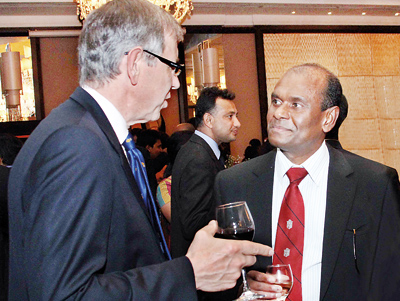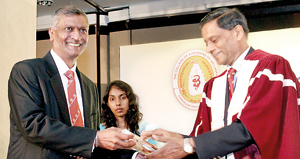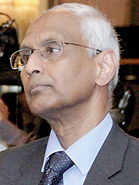News
Guidelines issued to achieve uniformity in performing stomach operations
It is one of the commonest surgeries performed in Sri Lanka – the opening and closing of the abdomen. This is what the College of Surgeons of Sri Lanka wants performed “in uniformity”, be it in Colombo, Anuradhapura, Jaffna, Batticaloa, Puttalam, Galle or Hambantota.
To achieve uniformity in the closure of the abdominal wall, in a “first” for the College of Surgeons, detailed ‘Guidelines’ were issued on Wednesday (August 21), amidst an eminent gathering of local and foreign delegates.

Dr. Ian Ritchie, President of the Royal College of Surgeons, Edinburgh in conversation with Dr. Nihal A. Weerasena, Consultant Cardiothoracic (Congenital) Surgeon at the Leeds General Infirmary, UK, at the reception
The ‘Guidelines’ were not the only first announced by the President of the College of Surgeons of Sri Lanka, Prof. Ranil Fernando, at the inauguration ceremony of their annual academic sessions at the Cinnamon Lakeside Hotel. The sessions were a joint meeting with the Royal College of Surgeons (RCS) of Edinburgh and the delegates also included surgeons from RCS England as well as Asia, Australia and New Zealand.
The ‘Guidelines’ established by the college deal with the science of tissue management in the midline abdominal wall closure, so that surgeons across the country would have evidence-based practice recommendations.
The other “new activity” announced by Prof. Fernando who is also Professor in Surgery, Ragama Medical Faculty, University of Kelaniya, is the ‘Deshamanya Dr. P.R. Anthonis Memorial Research Fund’. Named after the Founder President of the college, it would help encourage surgeons to engage in research.
These activities are in keeping with the college theme for the year, ‘Excellence in post-graduate surgical education and research and providing equitable surgical care’. Another interesting segment of the annual sessions was the ‘Road Safety Programme’ with the participation of the police and the corporate sector.
The inaugural ceremony was enlivened by the images created in the mind’s eye by Chief Guest Prof. Leigh Delbridge of “surgery being like an armed savage” and Guest-of-Honour Ian Ritchie of the need for 3-D surgeons with love thrown in as an integral part of surgery.
“Surgery is like an armed savage who attempts to get that by force which a civilised man would get by stratagem,” said Prof. Delbridge quoting John Hunter.
That force is, quite simply, taking a sharp knife or scalpel, rendering your patient’s body asunder, and then removing by cutting, by burning, by crushing, by breaking bones or by whatever force is necessary, the tumour or diseased organ giving rise to your patient’s suffering, said this Professor of Surgery from the Northern Clinical School, University of Sydney and Royal Northshore Hospital, Australia, pointing out that “we do this day in day out, its our job, our profession.”

Dr. Ravi Pillai was made Honourary Fellows of the Sri Lanka College of Surgeons at the annual sessions. Pix by Indika Handuwala
Anyone else however committing such acts would be immediately arrested and jailed for criminal assault, but not we members of the surgical profession, according to him. “Indeed it goes further than simple physical assault if you look at the other acts we commit. Simply to achieve a diagnosis we prod and poke our hands into various bodily orifices, acts which in other circumstances, would lead to our arrest for indecent behaviour, we administer stuporific agents that would otherwise have us languish in jail as drug peddlers, we poison our patients with so much chemotherapy as to make the Borgias pale into insignificance, we burn them, we scar and mutilate them, and perform countless other acts that would be deemed as cruel and inhumane, if only we were not surgeons intent upon healing, upon eliminating cancer, upon mending damaged tissues.”
“It is indeed an extremely privileged profession,” stressed Prof. Delbridge, adding that not only are such acts accepted with gratitude by those upon whom we perform them, but we as surgeons actually get paid for the privilege.
Underscoring that “we as surgeons are members of a unique and privileged profession,” he explained that the means “we have as surgeons to heal are also the means to cause incalculable harm. As such one of our first duties as surgeons is to do no harm.”
Primum non nocere……… ‘first do no harm’, he said, pointing out that specially surgical intervention is capable of harm and so the first consideration must be to balance the potential for harm with the potential for good and only undertake treatment where the balance favours benefit. This principle of non-maleficence is fundamental to medical ethics.
Focusing on the three stages of a surgeon’s life as set out by Murray Brennan, former Chairman of Surgery at Memorial Sloane-Kettering, Prof. Delbridge said that in youth we focus largely on improved outcomes at all costs, secondly as we mature, in mid-surgical career we focus on the proof and evidence that any improvement in outcomes is real, whilst thirdly, as we get older and enter our surgical maturity, we focus on minimizing harm to those who cannot benefit.

Dr. Nihal Kulathilake was made Honourary Fellows of the Sri Lanka College of Surgeons at the annual sessions. Pix by Indika Handuwala
He added: “It is indeed an interesting concept – what he was really saying was that, when we first graduate as surgeons and are intent on ‘proving’ ourselves, there is the ever present risk of the temptation to do too much, to attempt operations that may be beyond our experience, or just a little outside our surgical specialty or to treat patients who have little chance of benefiting from our surgical skills, as great as they might be.
“On the other hand, as we approach the end of our surgical careers, we tend to look back, and remember all those patients whom we have not helped, indeed whom we may well have harmed, by over-judicious or ill advised surgical procedures, and our surgical practice changes to make us more ‘risk averse’. The trouble is that both extremes have the potential to harm patients.”
The principle is the same across all of surgery – Primum non nocere – however the first principle of the practice of surgery involves not just avoiding harmful procedures, but also ensuring that appropriate procedures are provided safely. The secret therefore for all of us, at both ends of the surgical age spectrum, is education and training, added Prof. Delbridge.
Referring to the need for change, Consultant Trauma and Orthopaedic Surgeon Dr. Ritchie who is President of the Royal College of Surgeons of Edinburgh, meanwhile, said that while change for change’s sake is not a good idea, there is a need to look critically at what “we are going to change” coming back to the idea of quality.
What is quality and how do we measure it, he asked, explaining that it is easy to define quality with monocular vision – I set the standard and I judge whether I have achieved it. This is what we tend to do once we are deemed as trained and accredited as surgeons.
Binocular vision is better than monocular, according to him as it gives some perspective on the object in view. It encourages a surgeon to reflect on the work done and how to improve, assisted by feedback from patients and colleagues.
For Prof. Ritchie, however, the 3-D model of looking at quality is the best…..a holistic examination of the environment in which you work and the processes of care that you deliver along with other elements of how you interact with your colleagues and patients. This becomes “truly three-dimensional” when we are really prepared to accept the real possibility that what we do may be less than perfect.
Pointing out the three elements of structure, process and outcome that form parts of the whole when examining how care is delivered, Dr. Ritchie mentioned the element that makes the whole system work really well is love, as espoused by Donabedian.
“If we are serious about the quality and safety of the care that we give to our patients and our communities, we must not lose sight of the component of kindness or love which will dictate that we look carefully at what we do and the effect that our actions have on others…..It will also help us to ensure that the safety of our patients is woven into the everyday fabric of all that we do,” he added.
comments powered by Disqus
